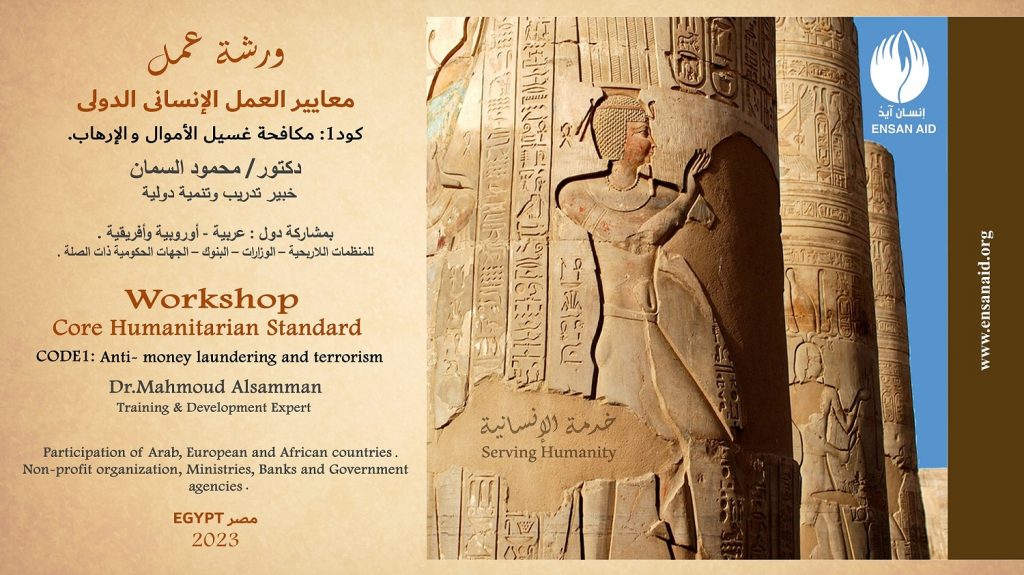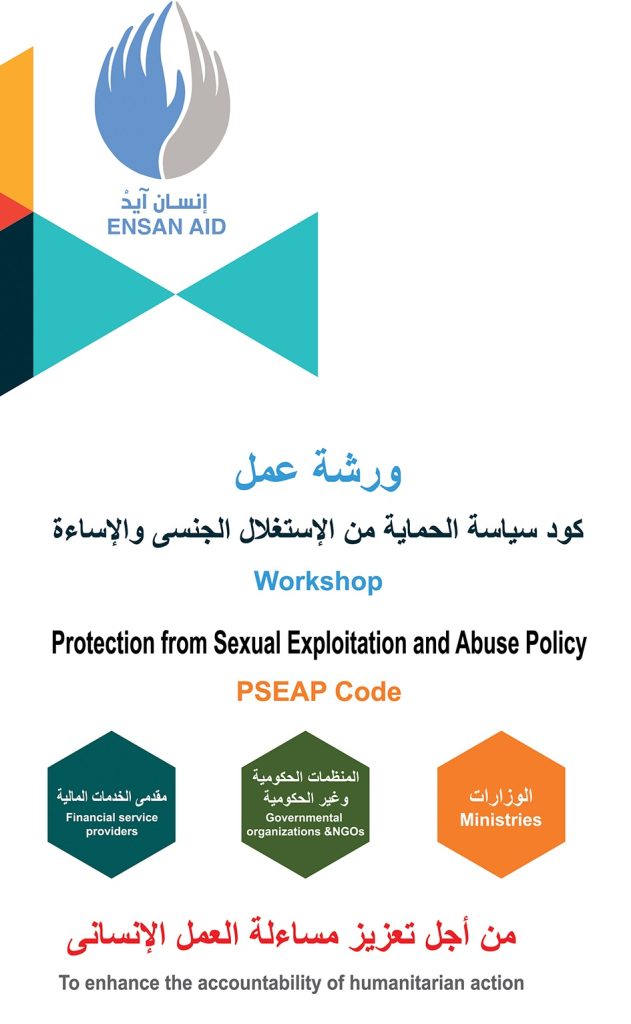Egypt – Qena / Workshop ; Standards of Humanitarian Work / Code 1 Anti- Money Laundering and Terrorism – the first workshop in Egypt and the Arab world with the participation of Arab, European and African countries. Directed to non-profit organizations, ministries, government agencies, banks and related agencies that support the work of non-profit organizations and in order to protect and maintain the non-profit sector by providing methods and mechanisms for governments and the non-profit sector in order to protect these entities from abuse and enhance transparency in their operations and prevent abuse Use those charitable humanitarian efforts.
The methodology, code and training were designed by His Excellency Dr. / Mahmoud Al-Samman -Training and Development Expert.
Who can apply:
Non-profit organizations (executive directors – sector managers or those responsible for the compliance file) government agencies, banks and relevant ministries.
There will be a subscription fee.
Attendance priority will be for organizations that have a large volume of business and activities, especially international ones, and therefore due to the limited attendance in this first phase (code 1).
Workshop topics:
Core Humanitarian Standard / Cod1: Anti-Money Laundering and Terrorism
For non-profit organizations, ministries, government agencies that supervise the oversight of humanitarian charitable organizations – government agencies related to the work of humanitarian charitable organizations and banks.
Introduction: Introduction and background information.
2)Purpose and context.
3)The risk-based approach _ based on the impact. RBA- IMPACT
(The methodology of working on impact in: strategic plans, development programs, relief and disaster management, received international recommendations, and Dr. Mahmoud Al-Samman developed this methodology in 2007. Training and technical support is provided on this methodology for many international organizations).
- Understanding of risk – based on impact.
- Risk analysis.
- Strategies to mitigate risks and limit. (Impact-based mitigation strategies).
- Threat and risk triangle. (The strongest and weakest effect _ 5 sequential effects).
4)An impact-based gap analysis approach for non-profit organizations (GAMNS).
- The importance of the gap analysis approach and introducing it.
- Analysis based on gaps and risks in logistical supplies in development projects and relief aid (GRLS) .
- Analysis of gaps and risks in SG grants (the most vulnerable scopes granted by organizations, especially relief and international development).
5) Integration in sectors and policies (ISP).
6) Integration into policy dialogue (IPD) .
7) The basics of the continuous awareness plan from the authority entrusted with supervising and controlling non-profit organizations (for example, raising awareness of the risks and applications of the five codes, which were developed by Dr. Mahmoud Al-Samman and have been applied for more than 8 years – or a plan that the authority deems appropriate after monitoring needs).
8) Supervision and oversight by the concerned authorities of the work of non-profit organizations / based on the methodology of partnership and cooperation:
- Matching and reviewing the laws regulating work and keeping pace with international work and the work of organizations and their environment.
- Partnership-based control systems.
- Weaknesses, strengths, and the approach of the integration strategy in combating money laundering and terrorism.
9) The methodology of linking impact, results and financial support. (The impact-based methodology)
Code 3: Planning the program or projects to prevent the occurrence of threats
(Code 2: development projects based on impact and based on a risk approach. It will be discussed in the second workshop in detail, and it is considered one of the most important work codes that come under the standards of humanitarian work, which was designed by Dr. Mahmoud Al-Samman and trained by many organizations around the world).
10)Effective information gathering and verification
11) Organizational governance and integrity. (Effective governance and appropriate oversight mechanisms).
12) Human resources in external conflict areas (conflict areas and the provision of humanitarian assistance).
13)Accountability, accounting, financial and technical transparency.
14) Partnerships, Audit and Examination.
15) Examples of some countries in best practices and measures.
16) Recommendations.
Workshop language: The workshop will be available in Arabic and English, and publications will be presented in 3 languages, Arabic, English and French.
Note: The priority of attendance will be for organizations that have a large volume of work and activities, and therefore, due to the limited attendance in this first phase (code 1). And there will be other related workshops: to implement 5 other work codes in support of international humanitarian work, for example: Code (2) Transparency – Code (3) management of development projects based on impact and based on risk approach – Code (4) existing strategic plans On the risk impact approach, especially in areas of external conflicts (conflict areas) and other five international codes, which were designed by His Excellency Dr. Mahmoud Al-Samman – an expert in international training and development, which we have been working on applying for years.





